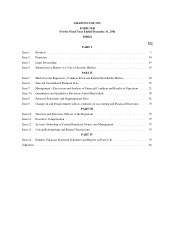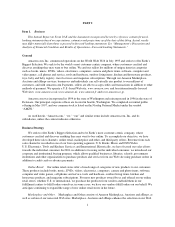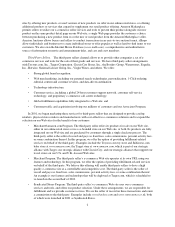Amazon.com 2001 Annual Report Download - page 19
Download and view the complete annual report
Please find page 19 of the 2001 Amazon.com annual report below. You can navigate through the pages in the report by either clicking on the pages listed below, or by using the keyword search tool below to find specific information within the annual report.systems and network infrastructure to accommodate both increased traffic on our Web sites and increased sales
volume, and integrate our systems.
Our computer and communications systems and operations could be damaged or interrupted by fire, flood,
power loss, telecommunications failure, break-ins, earthquakes, acts of war or terrorism and similar events. We
do not have backup systems or a formal disaster recovery plan, and we may have inadequate insurance coverage
or insurance limits to compensate us for losses from a major interruption. Computer viruses, physical or
electronic break-ins and similar disruptions could cause system interruptions, delays and loss of critical data, and
could prevent us from providing services and accepting and fulfilling customer orders. If this were to occur, it
could damage our reputation and be expensive to remedy.
We May Not Be Successful in Our Efforts to Expand into International Market Segments
We plan, over time, to continue to expand our reach in international market segments. We have relatively
little experience in purchasing, marketing and distributing products or services for these market segments
and may not benefit from any first-to-market advantages. It is costly to establish international facilities and
operations, promote our brand internationally, and develop localized Web sites and stores and other systems. We
may not succeed in these efforts. Our net sales from international market segments may not offset the expense of
establishing and maintaining the related operations and, therefore, these operations may never be profitable.
Our international sales and related operations are subject to a number of risks inherent in selling abroad,
including, but not limited to, risks with respect to:
‰currency exchange rate fluctuations,
‰local economic and political conditions,
‰restrictive governmental actions (such as trade protection measures, including export duties and quotas
and custom duties and tariffs),
‰import or export licensing requirements,
‰limitations on the repatriation of funds,
‰difficulty in obtaining distribution and support,
‰nationalization,
‰longer receivable cycles,
‰consumer protection laws and restrictions on pricing or discounts,
‰lower level of adoption or use of the Internet and other technologies vital to our business, and the lack
of appropriate infrastructure to support widespread Internet usage,
‰lower level of credit card usage and increased payment risk,
‰difficulty in developing employees and simultaneously managing a larger number of unique foreign
operations as a result of distance, language and cultural differences,
‰laws and policies of the U.S. affecting trade, foreign investment and loans, and
‰tax and other laws.
As the international e-commerce channel continues to grow, competition will likely intensify. Local
companies may have a substantial competitive advantage because of their greater understanding of, and focus on,
the local customer, as well as their more established local brand name recognition. In addition, governments in
foreign jurisdictions may regulate e-commerce or other online services in such areas as content, privacy, network
security, copyright, encryption, taxation or distribution. We may not be able to hire, train, retain, motivate and
manage required personnel, which may limit our growth in international market segments.
10
























